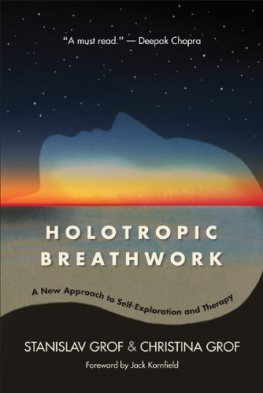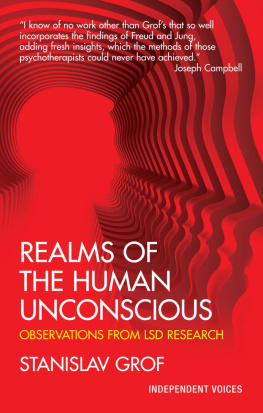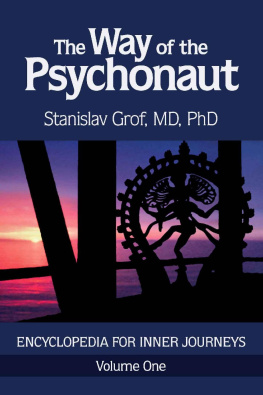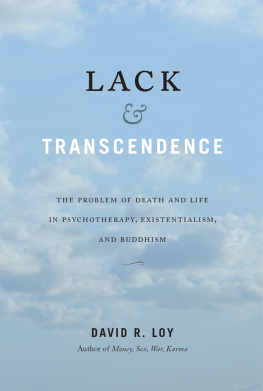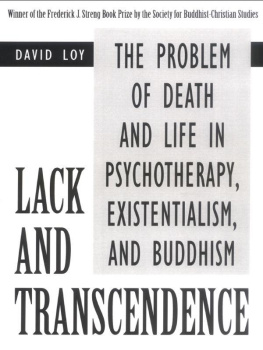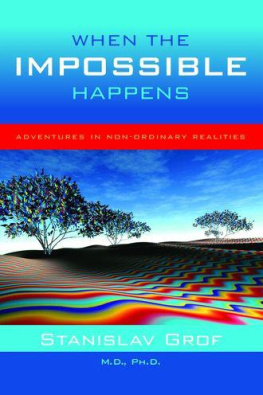Grof - Beyond the Brain : Birth, Death, and Transcendence in Psychotherapy
Here you can read online Grof - Beyond the Brain : Birth, Death, and Transcendence in Psychotherapy full text of the book (entire story) in english for free. Download pdf and epub, get meaning, cover and reviews about this ebook. year: 1985, publisher: LightningSource, genre: Romance novel. Description of the work, (preface) as well as reviews are available. Best literature library LitArk.com created for fans of good reading and offers a wide selection of genres:
Romance novel
Science fiction
Adventure
Detective
Science
History
Home and family
Prose
Art
Politics
Computer
Non-fiction
Religion
Business
Children
Humor
Choose a favorite category and find really read worthwhile books. Enjoy immersion in the world of imagination, feel the emotions of the characters or learn something new for yourself, make an fascinating discovery.

- Book:Beyond the Brain : Birth, Death, and Transcendence in Psychotherapy
- Author:
- Publisher:LightningSource
- Genre:
- Year:1985
- Rating:4 / 5
- Favourites:Add to favourites
- Your mark:
- 80
- 1
- 2
- 3
- 4
- 5
Beyond the Brain : Birth, Death, and Transcendence in Psychotherapy: summary, description and annotation
We offer to read an annotation, description, summary or preface (depends on what the author of the book "Beyond the Brain : Birth, Death, and Transcendence in Psychotherapy" wrote himself). If you haven't found the necessary information about the book — write in the comments, we will try to find it.
Grof: author's other books
Who wrote Beyond the Brain : Birth, Death, and Transcendence in Psychotherapy? Find out the surname, the name of the author of the book and a list of all author's works by series.
Beyond the Brain : Birth, Death, and Transcendence in Psychotherapy — read online for free the complete book (whole text) full work
Below is the text of the book, divided by pages. System saving the place of the last page read, allows you to conveniently read the book "Beyond the Brain : Birth, Death, and Transcendence in Psychotherapy" online for free, without having to search again every time where you left off. Put a bookmark, and you can go to the page where you finished reading at any time.
Font size:
Interval:
Bookmark:
Beyond the Brain
SUNY Series in Transpersonal and Humanistic
Psychology Richard D. Mann and Jeanne B. Mann, Editors
Birth, Death, and Transcendence in Psychotherapy
Stanislav Grof

Published by
State University of New York, Albany
1985 State University of New York
All rights reserved
Printed in the United States of America
No part of this book may be used or reproduced in any manner whatsoever without written permission except in the case of brief quotations embodied in critical articles and reviews.
For information, address State University of New York
Press, State University Plaza, Albany, N.Y., 12246
Library of Congress Cataloging in Publication Data
Grof, Stanislav, 193l
Beyond the brain.
Bibliography: p.
Includes index.
1. Transpersonal psychotherapy. 2. Consciousness.
3. Subconsciousness. 4. PsychiatryPhilosophy.
I. Title.
RC489.T75G76 1985 616.8914 85-14882
ISBN 0-87395-953-1
ISBN 0-87395-899-3 (pbk.)
15 14
To Christina, Paul, and my mother Maria
is reprinted with permission from Timothy Leary, Politics of Ecstasy (New York: G. P. Putnams, 1965).
is reprinted by permission from Michael Wenyon, Understanding Holography (New York: Arco Publishing).
are reprinted with permission from J. Roubivek*, Experimental Psychoses (Prague: Sttn Zdravotnick Nakladatelstvi, 1961).
are reprinted by permission from H. Giger, Necronomicon (Basel: Sphinx, 1977).
are reprinted by permission from K. Seligman, The History of Magic (New York: Pantheon, 1948).
is reprinted by permission from the Bodleian Library, Douce Portfolio W.7.7.
This book is the product of an intensive and systematic search that has extended over a period of almost three decades. In all the stages of this long quest, the professional and personal dimensions were so intimately interwoven that they have merged into an inseparable amalgam. It has been a journey of personal transformation and self-discovery as much as a process of scientific exploration of uncharted territories of the human psyche.
Over the years, I have received inestimable help, encouragement, and inspiration from many people who have been important in my life, some as teachers, others as friends and fellow searchers, and a few in a combination of all these roles. It is impossible here to mention all of them by name. However, in several instances the contributions have been so outstanding that they deserve special notice.
Angeles Arrien, an anthropologist trained in the Basque mystical tradition, has been a true friend and a living example of how to integrate the feminine and masculine aspects of ones psyche and how to walk the mystical path with practical feet.
Anne and Jim Armstrong have taught me much about the nature of a genuine psychic gift and about the evolutionary potential of transpersonal crises. Their excitement, enthusiasm, and courage in exploring the human psyche and the unknown provide a unique example of a shared adventure in consciousness.
Gregory Bateson, with whom I had the privilege to spend many hours of intense personal and intellectual interaction during the two and a half years before his death, when we both were scholars-in-residence at the Esalen Institute in California, was an important teacher and a special friend. His incisive critique of mechanistic thinking in science and his creative synthesis of cybernetics, information and systems theory, psychiatry, and anthropology have had a profound influence on my own development.
Joseph Campbell, brilliant thinker, master teacher, and a dear friend, has taught me invaluable lessons about the paramount relevance of mythology for psychiatry and our everyday life. His influence on my personal life has been equally profound.
Fritjof Capras work has played a critical role in my own intellectual development and scientific quest. Reading his Tao of Physics gave me firm hope that the extraordinary observations from modern consciousness research could in the future be integrated into a new and comprehensive scientific world view. Our friendship over the years, and a rich exchange of information during the time he was writing The Turning Point, have been of great help for my work on the present book.
Michael and Sandra Harner, who belong to our most intimate circle of friends, have given me much support, encouragement, and opportunity for the sharing of unconventional observations and information. Michael, who combines the role of a respectable academician and an accomplished white shaman, provides an important model and example for my own life.
Swami Muktananda Paramahansa, the late spiritual teacher and head of the Siddha Yoga lineage, with whom I have had much contact over the years, gave me the unique opportunity to observe and experience the powerful influence of a vital mystical tradition on human lives.
Ralph Metzner, who combines in a unique way solid scholarship, an inquisitive mind, and an adventurous spirit, has been an important friend and fellow searcher.
Rupert Sheldrake has been able to formulate with unusual clarity and incisiveness the limitations of mechanistic thinking in natural sciences that I have myself been aware of for many years. His work has helped me considerably to free myself from the straitjacket of the belief systems imposed on me by my professional training.
Anthony Sutich and Abraham Maslow, the two main initiators and founders of both humanistic and transpersonal psychology, were for me important sources of inspiration, giving a concrete form to some of my dreams and hopes concerning the future of psychology. It was an unforgettable experience to be with them at the cradle of the transpersonal movement.
Arthur Youngs theory of process represents one of the most exciting concepts I have encountered during my intellectual life. My appreciation of it as a scientific metaparadigm of the future has been increasing rapidly as I become more intimately acquainted with it.
The discovery of the holonomic principles opened for me an entirely new world of possibilities for theoretical speculations and practical applications. My special thanks here belong to David Bohm, Karl Pribram, and Hugo Zucarelli.
My clinical work with psychedelics has played a critical role in instigating my lifelong interest in consciousness research and in generating the most important data discussed in this book. It would not have been possible without the epoch-making discoveries of Albert Hofmann. I would like to express here my deep gratitude for the profound influence that his work has had on my professional and personal life.
The stimulating atmosphere of the Esalen Institute and the natural beauty of the Big Sur coast have provided a unique setting for the work on this book. I would like to thank my Esalen friends, Dick and Chris Price, Michael and Dulce Murphy, and Rick and Heather Tarnas for their support over the years. In addition, Rick taught me much about the relationships between astronomical processes and the archetypal dynamics. Kathleen OShaughnessy deserves special thanks for her dedicated and sensitive help in the final typing of the manuscript.
My deepest thanks go to the immediate members of my family my mother Maria, my brother Paul, and my wife Christina. They have carried the most immediate impact of the intellectual, psychological, philosophical, and spiritual roller coaster of my unconventional quest over the years. Christina, in particular, has been my closest friend and fellow searcher for many years, sharing both my personal and professional life. We have jointly developed and practiced the technique of holotropic therapy described in this book. I have learned from her own dramatic personal journey many lessons that only life can provide. She has also been the main inspiration for the Spiritual Emergency Network that we jointly launched in Big Sur, California.
Next pageFont size:
Interval:
Bookmark:
Similar books «Beyond the Brain : Birth, Death, and Transcendence in Psychotherapy»
Look at similar books to Beyond the Brain : Birth, Death, and Transcendence in Psychotherapy. We have selected literature similar in name and meaning in the hope of providing readers with more options to find new, interesting, not yet read works.
Discussion, reviews of the book Beyond the Brain : Birth, Death, and Transcendence in Psychotherapy and just readers' own opinions. Leave your comments, write what you think about the work, its meaning or the main characters. Specify what exactly you liked and what you didn't like, and why you think so.

